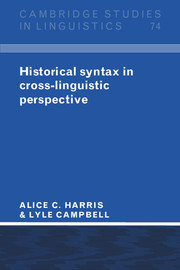Book contents
- Frontmatter
- Contents
- Preface
- List of abbreviations
- 1 Introduction
- 2 The history of historical syntax: major themes
- 3 Overview of a theory of syntactic change
- 4 Reanalysis
- 5 Extension
- 6 Language contact and syntactic borrowing
- 7 Processes that simplify biclausal structures
- 8 Word order
- 9 Alignment
- 10 On the development of complex constructions
- 11 The nature of syntactic change and the issue of causation
- 12 Reconstruction of syntax
- Appendix
- Notes
- References
- Index of languages and language families
- Index of scholars
- Index of subjects
8 - Word order
Published online by Cambridge University Press: 05 June 2012
- Frontmatter
- Contents
- Preface
- List of abbreviations
- 1 Introduction
- 2 The history of historical syntax: major themes
- 3 Overview of a theory of syntactic change
- 4 Reanalysis
- 5 Extension
- 6 Language contact and syntactic borrowing
- 7 Processes that simplify biclausal structures
- 8 Word order
- 9 Alignment
- 10 On the development of complex constructions
- 11 The nature of syntactic change and the issue of causation
- 12 Reconstruction of syntax
- Appendix
- Notes
- References
- Index of languages and language families
- Index of scholars
- Index of subjects
Summary
Introduction
In the last two decades word order has perhaps received more attention than any other issue in diachronic syntax. Most of this work has looked at word order change from the point of view of word order universals, first discovered by Greenberg (1963) and further studied by many others since then. Diachronic studies inspired by Greenbergian universals have been widely criticized on grounds of methodology and are not widely accepted. We have tried to take a fresh approach to these issues. After a general introduction in the present section to the questions involved, we begin by examining the basis for the widespread assumption that the order of morphemes in a word and the order of words in a compound reflect, in some sense, the order of words in a clause (section 8.2). We show that while this is often true of bound morphemes, it is not always; in compounds there seems to be little basis at all for such an assumption. In section 8.3 we look at the types of word order change that result from reanalysis and show that through reanalysis it is possible for an order to be introduced that is disharmonic with the rest of the language. This offers a solution to the long-standing problem of how, if word order harmony is a preferred state, a language could begin to change from one harmony to another.
Information
- Type
- Chapter
- Information
- Historical Syntax in Cross-Linguistic Perspective , pp. 195 - 239Publisher: Cambridge University PressPrint publication year: 1995
